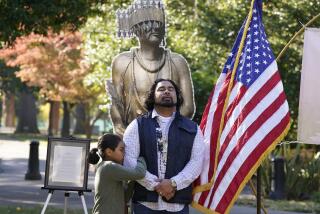Newport Firm Enters Pact for Casino Near Palm Springs
- Share via
NEWPORT BEACH — A Las Vegas casino operator said Monday that it has signed an agreement with a Newport Beach company to build a casino on Indian land near Palm Springs.
Elsinore Corp., which operates the Four Queens Casino in downtown Las Vegas, will own 85% of the venture in conjunction with the Native American Casino Corp., a group of about two dozen investors in Newport Beach. The casino would be on 55 acres of the Twenty-nine Palms tribal reservation at Interstate 10 and California 60.
If it wins regulatory approval quickly, the casino could open in six months, said Jim Brewer, vice president of Native American Casino Corp. The cost of the project was not disclosed.
The deal comes about three months after Caesars World Inc., owner of the swank Caesars Palace resort on the Las Vegas Strip, announced that it will build a gambling hall on land owned by the Agua Caliente band of Cahuilla Indians near Palm Springs.
Like Caesars, Elsinore envisions a Nevada-style club even if it is limited to card games, paper pull-tabs similar to lottery scratch-off games, bingo and off-track betting.
A coalition of California tribes is hoping to win pending litigation that would allow the group to offer slot machines and blackjack as well.
The new casino, still in the design stage, would appeal to tourists and locals alike, said Thomas E. Martin, Elsinore’s president. It would also be near new Sun City retirement community.
The Twentynine Palms tribe has fewer than two dozen members, none of whom live on the 162-acre reservation, said I. Nelson Rose, a Whittier Law School professor in Los Angeles who served as a consultant to the tribe on the project.
Speaking of the club project, Rose said: “The basic idea is to make it look, sound, taste, smell and feel as much like a Vegas casino as is allowed under California law.”
Only now, he said, are casino corporations beginning to understand the potential of gambling halls on Indian reservations.
For the Indians, one of the first benefits from the project would be enhanced incomes and funds to build tribal housing. As with all Indian reservation gaming projects, the American Indians who own the land would receive 60% or more of the profits, Brewer said.
More to Read
Inside the business of entertainment
The Wide Shot brings you news, analysis and insights on everything from streaming wars to production — and what it all means for the future.
You may occasionally receive promotional content from the Los Angeles Times.










